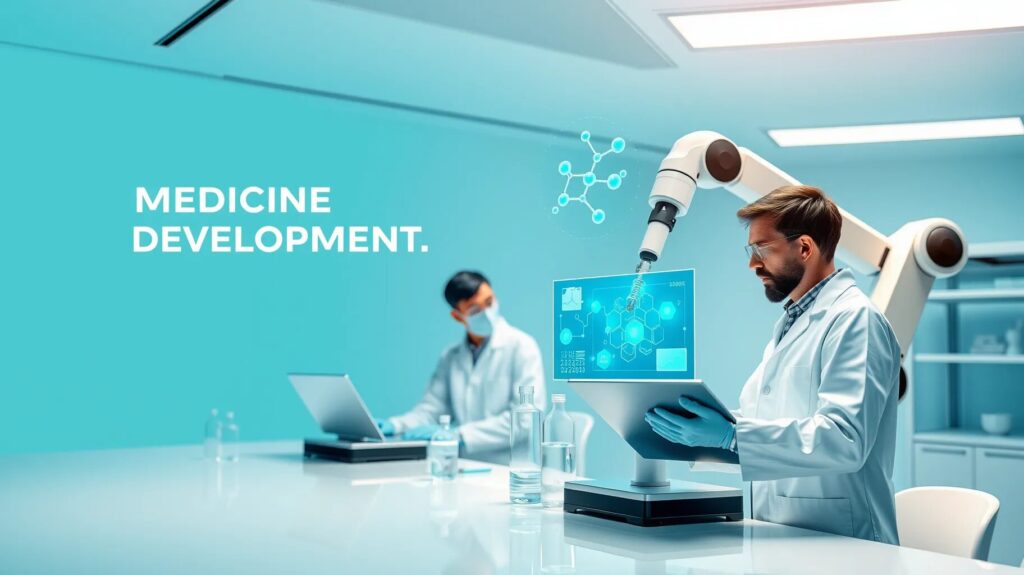
The Role of ChemTrain in Modern Drug Discovery
Imagine a world where developing a new medication doesn’t take decades but mere years. ChemTrain is a cutting-edge system that brings this vision closer to reality. By integrating artificial intelligence (AI) into the early stages of drug discovery, ChemTrain is redefining how we think about medicine development. This system is essentially a bridge that connects complex chemistry with practical medicine, making the entire process more efficient and cost-effective.
How ChemTrain Bridges the Gap Between Chemistry and Medicine
ChemTrain works by harnessing the immense power of AI to predict which chemical compounds are most likely to become successful drugs. Traditional drug discovery involves a lot of trial and error, but with ChemTrain, that process is streamlined. It analyzes vast datasets of chemical properties and biological interactions, identifying potential drug candidates faster than any human could. This ability to link chemistry and medicine seamlessly means that new treatments can be designed with unprecedented speed.
Accelerating Research: The Power of AI in ChemTrain
The real magic of ChemTrain lies in its AI-driven approach to research. By processing huge amounts of data in a fraction of the time it would take a team of researchers, ChemTrain can predict outcomes, identify patterns, and even suggest new avenues of research. This not only accelerates the research phase but also opens doors to innovations that might have been overlooked. The use of AI in this context is a game-changer, transforming how we approach the challenges of modern drug discovery.
Why Speed Matters in Drug Development
In the world of drug discovery, time isn’t just money—it’s also lives saved. The faster we can bring a new medicine from the lab to the patient, the more impact it has on global health. ChemTrain’s ability to speed up this process is one of its most significant advantages. By shortening the time it takes to develop a drug, ChemTrain helps ensure that life-saving treatments reach patients when they need them most.
AI-Driven Predictions: A New Era for Pharmaceuticals
AI isn’t just about speeding up the process; it’s also about making it smarter. With ChemTrain, AI-driven predictions are helping researchers avoid dead ends and focus on the most promising drug candidates. This not only reduces the risk of failure but also increases the chances of finding effective treatments for diseases that were previously considered incurable. As we enter this new era of pharmaceuticals, AI is proving to be an invaluable tool in the fight against illness.
Reducing Costs with ChemTrain: A Financial Game-Changer
Drug discovery is an expensive endeavor. The traditional process can cost billions and take years, if not decades, to complete. But ChemTrain is changing the game by drastically reducing these costs. By streamlining research and development, ChemTrain makes it possible to bring new drugs to market without the exorbitant price tag. This not only benefits pharmaceutical companies but also has a trickle-down effect on healthcare costs, potentially making medications more affordable for patients.
ChemTrain’s Influence on Precision Medicine
One of the most exciting aspects of ChemTrain is its potential to revolutionize precision medicine. By analyzing the specific needs of individual patients, ChemTrain can help design drugs that are tailor-made to be more effective for certain genetic profiles. This approach not only enhances treatment efficacy but also minimizes side effects, leading to a more personalized healthcare experience. As ChemTrain continues to evolve, its influence on precision medicine could lead to breakthroughs in treating complex diseases.
From Lab to Pharmacy: Streamlining the Drug Development Process

Traditionally, the journey from a research lab to a pharmacy shelf is a long and complicated one. It involves countless tests, trials, and regulatory hurdles. However, ChemTrain is simplifying this journey. By integrating AI into every step of the process, from initial research to final approval, ChemTrain ensures that drugs are developed more efficiently and with fewer setbacks. This streamlined approach means that new medications can be made available to the public much faster than ever before.
Key Success Stories: ChemTrain in Action
ChemTrain isn’t just a theoretical concept—it’s already making waves in the pharmaceutical world. There have been several success stories where ChemTrain has played a crucial role in developing new treatments. For example, some companies have used ChemTrain to identify promising compounds for treating rare diseases, something that would have been nearly impossible with traditional methods. These success stories are a testament to the system’s potential to transform drug discovery.
Challenges and Limitations: Can ChemTrain Solve Everything?
While ChemTrain is an impressive tool, it’s important to recognize its limitations. AI can process data faster than any human, but it still relies on the quality of that data. Inaccuracies or biases in the datasets can lead to flawed predictions. Moreover, the ethical implications of relying on AI for drug discovery cannot be ignored. Questions around data privacy, the potential for AI errors, and the role of human oversight are all challenges that need to be addressed.
The Ethical Considerations in AI-Driven Drug Discovery
The use of AI in drug discovery raises several ethical concerns. One major issue is the privacy of patient data. As ChemTrain and similar systems become more integrated into the healthcare industry, ensuring that patient information is handled securely becomes paramount. Additionally, the question of accountability arises—if an AI system makes a mistake, who is responsible? These ethical considerations are crucial as we continue to rely more on AI in medicine.
Collaboration Between Scientists and AI: A New Partnership
AI like ChemTrain isn’t here to replace scientists—it’s here to work alongside them. The best results come from a collaboration between human expertise and machine efficiency. Scientists bring the creativity and critical thinking needed to interpret data, while AI provides the speed and precision to process it. This partnership is leading to some of the most innovative and effective drug discoveries we’ve seen to date.
The Future of Drug Discovery: What’s Next for ChemTrain?
The future of ChemTrain looks incredibly promising. As technology continues to advance, we can expect ChemTrain to become even more powerful and accurate. Researchers are already exploring ways to improve its algorithms and expand its capabilities, potentially making it a key player in the fight against diseases like cancer and Alzheimer’s. The next few years could see ChemTrain leading the charge in some of the most important medical breakthroughs of our time.
Patient Impact: How Faster Drug Discovery Changes Lives
At the end of the day, the real impact of ChemTrain is on the patients. Faster drug discovery means that people suffering from life-threatening conditions can receive new treatments sooner. For those with rare or currently untreatable diseases, ChemTrain offers a glimmer of hope. It’s not just about creating new drugs—it’s about changing lives, one breakthrough at a time.
Global Implications: ChemTrain’s Reach Beyond Borders
ChemTrain’s influence isn’t confined to a single country or region—its impact is global. As more pharmaceutical companies and research institutions adopt this technology, we can expect to see a ripple effect across the world. This means that new drugs will be available to more people, including those in developing countries who might otherwise have limited access to cutting-edge treatments. The global reach of ChemTrain has the potential to revolutionize healthcare on an international scale.
Regulatory Hurdles: Navigating the AI-Driven Approval Process
As innovative as ChemTrain is, navigating the regulatory landscape remains a significant challenge. Traditional drug approval processes are rigorous, often requiring extensive clinical trials and meticulous documentation. However, integrating AI into this process introduces new complexities. Regulators must now evaluate not only the safety and efficacy of the drug but also the algorithms that helped develop it. This means that regulatory bodies, like the FDA, need to evolve their frameworks to accommodate AI-driven discoveries, ensuring that these new medicines meet the highest standards without unnecessary delays.
ChemTrain’s Role in Pandemic Response and Future Preparedness
The COVID-19 pandemic highlighted the urgent need for rapid drug development. ChemTrain could play a crucial role in future pandemic responses by speeding up the identification of effective treatments and vaccines. During a health crisis, time is of the essence, and ChemTrain’s ability to quickly sift through potential compounds could be a lifesaver. By preparing now, with systems like ChemTrain, we could significantly improve our ability to respond to future pandemics, potentially saving millions of lives.
Why ChemTrain Is Essential for the Next Generation of Medicine
As we look toward the future, it’s clear that ChemTrain is not just a tool for today but an essential part of tomorrow’s medical landscape. The next generation of medicine will likely be more personalized, more efficient, and more accessible—goals that align perfectly with what ChemTrain offers. By continuing to refine and expand this technology, we can ensure that it remains at the forefront of drug discovery, paving the way for medical advancements that were once the stuff of science fiction.
Challenges and Ethical Considerations
While the advantages of AI-powered recruitment tools are clear, it’s important to acknowledge the challenges. Ethical concerns around privacy and data security are paramount. Candidates must trust that their information is being handled responsibly. Additionally, there’s the risk of over-reliance on AI, which could lead to a lack of human judgment in the hiring process.
Another concern is the potential for AI to inadvertently perpetuate existing biases. If an AI tool is trained on biased data, it could reinforce those biases rather than eliminate them. Therefore, it’s crucial for companies to continuously monitor and refine their AI systems.
The Future of Recruitment
The future of recruitment lies in a harmonious blend of AI and human expertise. While AI can handle the heavy lifting, human recruiters will always play a vital role in the hiring process. Their ability to understand context, read between the lines, and build relationships is something AI, no matter how advanced, cannot replicate.
As AI technology continues to evolve, we can expect even more sophisticated tools to emerge. From AI-driven interviews to virtual reality assessments, the possibilities are endless. However, the goal remains the same: to find the right person for the job, faster and more efficiently than ever before.
In conclusion, AI-powered recruitment tools are transforming the hiring landscape. They offer unparalleled efficiency, reduce bias, and enhance candidate experiences. Yet, as with any technology, they must be used thoughtfully and ethically. The future of recruitment is bright, and with AI at the helm, it’s only going to get brighter.
Articles and Reports
- “The Future of Recruitment: How AI is Changing the Hiring Process” – Harvard Business Review
This article provides an in-depth analysis of the impact of AI on recruitment, highlighting both the benefits and potential pitfalls.
Read it here - “AI in Recruitment: A Comprehensive Guide” – SHRM (Society for Human Resource Management)
SHRM offers a detailed guide on how AI is used in recruitment, including case studies and best practices for implementation.
Visit SHRM’s Resource - “Artificial Intelligence in Recruitment” – Deloitte Insights
Deloitte’s report explores the adoption of AI in recruitment, focusing on the ethical considerations and the balance between AI and human roles.
Access the Report